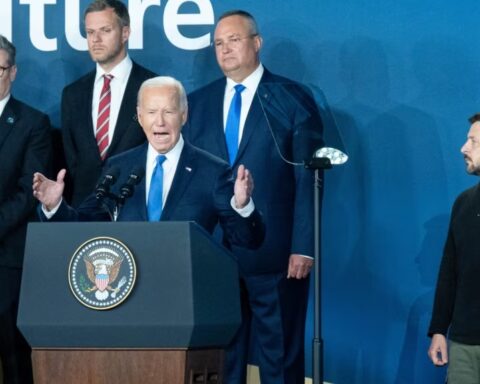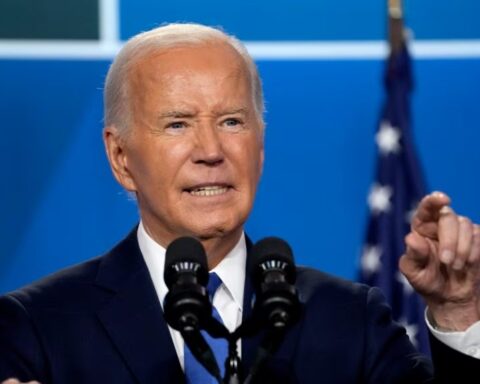U.S. Secretary of State Antony Blinken travels Tuesday to Guatemala for regional talks on migration.
Officials will be discussing “enforcement, migration management and refugee integration,” the State Department said, two years after a group of 20 countries agreed on a framework of cooperation on migration issues.
“Secretary Blinken will underscore our advances over the past two years and look ahead to next joint steps to bolster humane migration management and robust enforcement, lawful pathways and access to protection, and increasing refugee and migrant integration in the Americas,” State Department spokesperson Matthew Miller said in a statement.
The Los Angeles Declaration on Migration and Protection reiterated the need to create the conditions for “safe, orderly, humane and regular migration,” and committed to protecting the safety and dignity of migrants, refugees, asylum-seekers and stateless persons. It also highlighted the need to address the root causes that push people to leave their home countries.
In a call with reporters Monday, senior administration officials from the National Security Council and the Department of Homeland Security said the Biden administration acknowledges the complexity of the increase in migration in the region and emphasizes the importance of coordinated efforts and creation of lawful migration alternatives.
“By working together with our partners across the hemisphere, we can address a challenge impacting all of the Americas. … Spikes in migration present a complex challenge, but one we believe we can manage if we coordinate our efforts while creating lawful alternatives for people to migrate, settle and thrive, and of course, addressing the root causes,” according to a DHS official speaking on background — a method of sharing information without being identified.
And for the next couple of days, the DHS official said, the 22 endorsing countries to the L.A. Declaration will share the progress made under the combined efforts and identify the next steps, including job creation, programs to support vulnerable populations, and expansion of lawful pathways to the United States and other countries like Brazil and Colombia, among others.
“The data is overwhelming that these policies improve security and lead to economic growth. Colombia’s approach is already paying dividends,” the official said, citing an International Organization for Migration study that showed Venezuelan migrants and refugees in Colombia accounted for a $529.1 million economic impact in 2022.
“But we also know it can be difficult because the costs are today and the benefits are tomorrow,” the DHS official said, adding that the 22 endorsing countries to the L.A. Declaration recognized the benefits to their societies will outweigh the short-term costs.
Enforcement
U.S. officials also said that with the expansion of lawful migration paths and programs to support migrants, enforcement is in place.
On Monday, the State Department imposed visa restrictions on executives of several Colombian transportation companies moving migrants by sea.
“These companies prey on vulnerable irregular migrants by operating services designed primarily to facilitate irregular migration to the United States. … U.S. visa restrictions promote accountability for these actors and send a signal that no one should profit from vulnerable migrants — not smugglers, private companies, nor public officials,” per an official statement from State.
In 2023, Biden officials announced visa restrictions on individuals running charter flights into Nicaragua designed primarily for irregular migrants.
For those arriving at the U.S.-Mexico border to cross illegally into the U.S., a DHS official reiterated “serious consequence,” such as deportation for those who do not use lawful pathways and do not have a legal basis to remain.
“Take advantage of lawful pathways rather than make the dangerous irregular journey. … Individuals seeking international protection and other lawful pathways into the United States have many options, including refugee resettlement, humanitarian parole, family reunification, labor pathways and seeking asylum in host countries, as well as various other support services provided by international organizations and NGOs [nongovernmental organizations],” the DHS official said during Monday’s call.
Biden administration officials also urged countries to enforce their border laws. They said countries like Guatemala, Mexico and Panama should continue to work with the United States to streamline the process of repatriations and help where possible.
The DHS official said those repatriated from the U.S. “are being incorporated into other development programs. … So, they can enter reskilling programs to be able to get jobs and really reintegrate within their communities.”
Ongoing work
Under former Presidents Barack Obama and Donald Trump, there was a U.S. strategy for engagement in Central America that focused on pillars similar to the Biden administration strategy.
Facing a sharp increase of migrants crossing the U.S.-Mexico border at the beginning of his administration, President Joe Biden tasked Vice President Kamala Harris to lead a “root causes” strategy, banking heavily on using American investments to improve living conditions in three Central American nations known as the Northern Triangle: El Salvador, Guatemala and Honduras.
In February 2023, Harris announced a public-private partnership known as Central America Forward, bringing $5.2 billion in private-sector investment.
In late March, Biden hosted Guatemalan President Bernardo Arevalo for talks at the White House.
Cybersecurity
Before heading to Guatemala, Blinken spoke Monday at a cybersecurity conference in California, highlighting the need to work with international partners and promote responsible uses of technology such as artificial intelligence.
Blinken said having a strong position in developing and deploying technologies puts the United States in a position to “set standards and advance norms around the world.”
“Our advantage comes not just from our domestic strength,” Blinken said. “It comes from our solidarity with the majority of the world that shares our vision for a vibrant, open, and secure technological future, and from an unmatched network of allies and partners with whom we can work in common cause to pass the tech test. We’re committed not to digital sovereignty but digital solidarity.”














